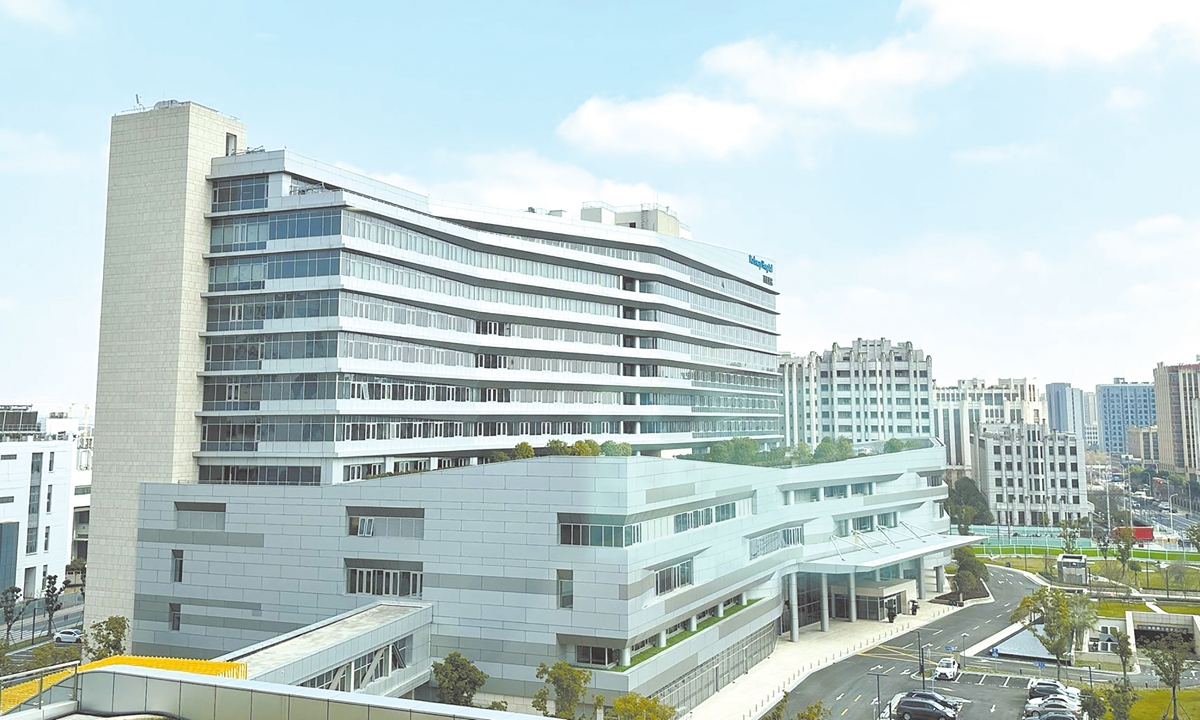
Parkway Shanghai Hospital, a multi-specialty hospital based in Shanghai, is co-developed by Singapore-based Parkway Pantai and Shanghai Hongxin Medical Investment Holding Co. The hospital was operational in February 2023. Photo: Courtesy of IHH Healthcare
The Shenzhen municipal government announced Sunday via its official WeChat account that Luye Medical Group has signed an agreement with the city's health commission to establish an international medical headquarters and a wholly foreign-owned specialty hospital. This marks the first such project in China, a significant step in the country's efforts to open its services sector.
The agreement was signed on Friday. Luye Medical is the regional healthcare services arm of Luye Life Sciences Group, which is headquartered in Singapore and operates across Australia, China, and Singapore. According to Luye Medical's official website, the company is committed to bringing top-tier medical technologies, advanced operational models, and innovative management systems to the Chinese market.
This development follows China's recent unveiling of a pilot plan on November 29 to allow wholly foreign-owned hospitals in nine regions, including Beijing, Shanghai, and South China's Guangzhou and Shenzhen. The initiative aims to attract high-quality international medical resources and enhance the diversity of domestic healthcare services.
Zhou Rong, a senior researcher at the Chongyang Institute for Financial Studies at Renmin University of China, told the Global Times on Sunday that compared with earlier practices where foreign medical institutions were limited to joint ventures or cooperative models, the new policy permitting wholly foreign-owned hospitals reflects progress in opening the healthcare sector after years of experimentation.
"Foreign-owned hospitals can provide Chinese patients with more diverse options and can also better serve foreigners living and working in China," Zhou said.
A healthcare expert told the Global Times on Sunday, on the condition of anonymity, that introducing foreign-owned hospitals reflects China's broader push to open up its economy. The expert noted that these hospitals will enrich the medical resources available to Chinese patients and encourage healthy competition within the sector.
The primary goal of foreign-owned hospitals is to introduce premium, high-end medical services that go beyond what public healthcare currently offers. They will also serve as a template for local high-end healthcare development, further advancing the country's medical services, the expert said.
Participation in international competition tends to accelerate industry progress, the expert added. In the healthcare field, introducing advanced global systems provides a valuable learning opportunity for China's domestic medical services.
The expert also emphasized that allowing foreign-owned specialty hospitals to operate in China will promote the development of commercial health insurance. "While China's current healthcare system primarily relies on public insurance, the arrival of foreign hospitals is expected to boost demand for private health insurance tailored to premium services," he said.
Separately, Tianjin in North China, another pilot city, announced plans on Wednesday to establish a foreign for-profit general hospital with a total investment of 1 billion yuan ($137.5 million) and 500 beds.
Several foreign healthcare providers have expressed optimism about the policy changes. Kenneth Tsang, regional CEO of Malaysia-based
IHH Healthcare, said in a recent interview with the Global Times, "We welcome these policy changes… As one of the first foreign healthcare providers to enter the Chinese market 20 years ago, we continue to evolve and scale up our healthcare offerings."
The initiative, jointly issued by the National Health Commission, Ministry of Commerce, National Administration of Traditional Chinese Medicine, and National Disease Control and Prevention Administration, outlines specific regions to advance the opening of China's healthcare sector.
The work plan details pilot tasks, conditions, and management measures. It requires foreign-owned hospitals to introduce advanced international management, service models, and medical technologies to fill local gaps in healthcare services. Compliance with relevant laws is mandatory, with at least 50 percent of management and healthcare personnel being Chinese mainland residents. Foreign doctors may practice under short-term permission as stipulated by the regulations.
The National Health Commission noted that the nine pilot regions - home to dense populations and robust healthcare demand - account for over 45 percent of China's utilized foreign capital. These areas feature strong medical infrastructure, favorable business environments, and concentrated foreign investment, making them ideal locations for the pilot program.
 中文
English
中文
English
 中文
English
中文
English
